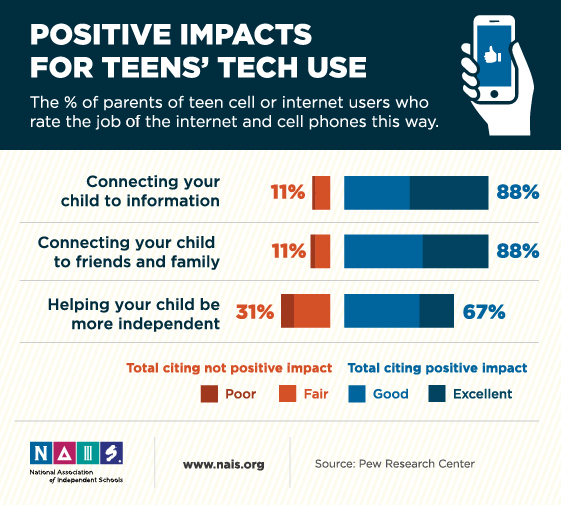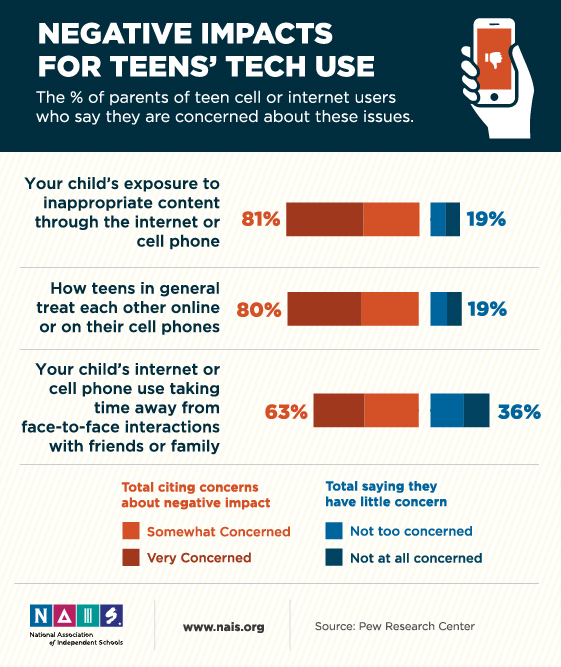The following four paragraphs are excerpts from a recent article from Donna Orem, President of the National Association of Independent Schools (NAIS). BFS is a NAIS member school. Please be sure to check out the last section – introducing Common Sense Media.

For parents today, not only are there hundreds of channels to monitor, but teens have access to the internet, video games, social media, and more; not to mention that smartphones provide access, in the palm of their hands, to nearly anything, whenever desired. Perhaps even more important, TV is primarily a passive device, while today’s technology is interactive, connecting teens not only to friends and students worldwide, but also to bullies and predators. There is a yin and a yang to technology that is hard for parents and educators alike to balance.
In its 2015 publication “Teens, Social Media & Technology,” the Pew Research Center reported that 92 percent of teens say they go online daily, with 24 percent noting that they are online constantly. Three-quarters of responding teens own or have access to a smartphone. Of that group, 91 percent access the internet through their smartphone.
A 2011 Pew study, “Teens, Kindness and Cruelty on Social Network Sites,” explored parents’ attitudes and concerns about this connectivity. Parents responding to the survey noted that the internet and mobile devices help kids make connections to information, and friends and family, and allow children to become more independent. On the negative side, parents said it exposes kids to inappropriate content, can provide a platform for poor online behavior, and takes time away from important face-to-face interactions.

Some worry that the ever-expanding obsession with technology may be more harmful, particularly for teen mental health. In a recent Atlantic feature story “Have Smartphones Destroyed a Generation?” author Jean Twenge notes that, for the generations that have grown up digital, the smartphone has radically altered “every aspect of teenagers’ lives, from the nature of their social interactions to their mental health.” She further states that today’s teens may be on the verge of a mental health crisis the likes of which we have never seen. Quoting statistics from the Monitoring the Future study, funded by the National Institute on Drug Abuse, Twenge reports that: “Teens who spend more time than average on screen activities are more likely to be unhappy, and those who spend more time than average on nonscreen activities are more likely to be happy. Eighth-graders who spend 10 or more hours a week on social media are 56 percent more likely to say they’re unhappy than those who devote less time to social media.”
____________________________________________________________________________
What can parents and educators do to educate themselves and make informed decisions about the media they are considering permitting their children to have access to? For several years, I have found the resources provided by Common Sense Media to be excellent and thought-provoking. Their mission:
“Common Sense is the leading independent nonprofit organization dedicated to helping kids thrive in a world of media and technology. We empower parents, teachers, and policymakers by providing unbiased information, trusted advice, and innovative tools to help them harness the power of media and technology as a positive force in all kids’ lives.”

Thanks, Paul. Your post was very enlightening. This is definitely the elephant in the room. I do love using Common Sense Media to check ratings for movies. It forgot that they reviewed social media platforms and video games as well. This will remind me to check in with CSM instead of struggling to do my own research.
This topic is always of interest to me. I have started reading Jordan Shapiro”s The New Childhood: Raising Kids to Thrive in a Connected World. So far, It isn’t telling me what I realized I wanted to hear — something along the lines that so much screen time is rotting kids’ brains. Shapiro posits that we are reacting, as all parents have always reacted, to the aspects of our children’s lives that are not replicas of our own childhoods. I need to keep reading. Here’s an excerpt:
Sons against fathers, daughters versus mothers, Jedi Knights slaying Sith Lords. Just like Socrates, your words will end up bringing on the very thing you set out to prevent. You will become a limiting factor in your own children’s heroic lives. Please don’t let that happen. I know parenting is hard. Especially when you don’t really understand the game. There is no rule book describing what it is supposed to look like in the twenty-first century because digital play—like all the other transformative technological shifts that came before—is changing the very nature of child-rearing. Parents, teachers, and caregivers all need to think critically and intentionally about how they can and should adjust their habits, expectations, and customs accordingly. This book can help.
Well said, Nancy! I will definitely check out Shapiro’s book. Thank you!